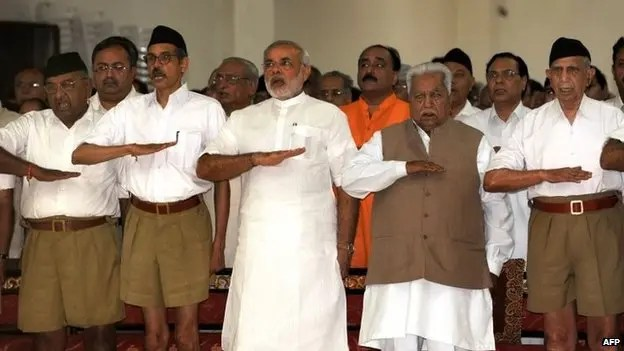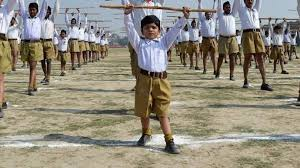Prime Minister Narendra Modi was once a full-time RSS worker. Stating this could be obvious but it is also a matter of fact that both Modi and the organisation are proud of each other.
In 2014, RSS chief Mohan Bhagwat's speech during Dusherra festival (or Vijaya Dashmi) was telecast by Doordarshan. The main opposition Congress and the Communist parties criticised the decision, accusing the Modi government of being remote-controlled by the RSS - also labelled as the controversial organisation.
Officially it was later clarified that Bhagwat's address was "covered" on its own merit as a news event and the government had nothing to do with the decision.
Established in 1925, the RSS (also known as the Sangh) has been banned three times in post-Independence India.
Last ban was in 1992 after the demolition of the disputed structure at Ayodhya on Dec 6, 1992.
Prior to that the first ban came after the assassination of Mahatma Gandhi in 1948 - the organisation was accused of plotting the gory episode.
The group was once again banned in 1975 when then-Prime Minister Indira Gandhi had imposed Emergency and suspended all fundamental rights and jailed almost the entire opposition leadership.
The RSS used this opportunity to build alliances with anti-Congress forces and spread its political influence. Under various regimes and difficult and even challenging episodes; it had umbilical bond with top BJP leaders.
In the late 1980s, the RSS, through its affiliates, launched a massive movement to build a Hindu temple at the place of a medieval mosque in the northern town of Ayodhya.
The Babri Masjid (mosque) was demolished in December 1992 by supporters of radical Hindu groups, including the RSS. The group was outlawed for a third time but the courts overturned the decision.
Generally the debate is -- Has the RSS/Sangh fountainhead been able to force the Modi government to follow its agenda?
Or, a "tough leader" - as the image goes - Namo allow this to happen? Or, will both the BJP and the RSS will work together towards the similar goal of establishing Hindutva as an all-encompassing, superior political ideology in modern India giving an entirely neo but assertive Hindu nationalism.
There is now a new thought process or quite a convincing argument. That Partition of India (Bharat) took place on the basis of religion and hence while Muslims walked away with their own land - Pakistan -- the Hindus have every right to talk about their own religious right, identity and expansion of the Hindu wisdom.
"Bharat being an ancient culture with rich traditions has the experiential wisdom to create a harmonious world. Our thought protects the entire humanity from divisive and self-destructive tendencies and ensures peace and a sense of oneness among living and non-living beings," says a RSS statement.
Thanks to Modi government, two key milestones of the Sangh - abrogation of Article 370 in Jammu and Kashmir and construction of a grand Ram temple have been achieved.
Works have already begun with a greater push for achieving the third Milestone - the Uniform Civil Code (UCC). A few states have taken the lead already.
Clad in khaki shorts and white shirts, RSS cadres regularly gather in small groups in parks and street corners in different Indian cities and towns to work out, sing patriotic songs, play games and talk about the past glory of "Hindu India".
These groups are called shakhas (branches) and are the backbone of the organisation's countrywide network of committed workers. Sources say there are RSS shakhas in 50,000-70,000 villages, small towns, far-flung areas and cities across the country.
But it does not maintain a membership register.
Of course, "only Hindu males" can join the RSS. For women, there is another organisation called the Rashtra Sevika Samiti (National Women Volunteers' Committee).
After the BJP lost the election to Congress in 2004, the RSS appeared to have been cornered during the communist-backed and Sonia Gandhi-controlled UPA regime. Perhaps the RSS and other Sangh organisations such as Vishwa Hindu Parishad (VHP) have learnt the hard way that they all need (especially RSS itself) a friendly Central government in Delhi if they want to remain influential.
In 2013, therefore, the RSS showed great pragmatism by backing Modi as the BJP's PM candidate for the 2014 general elections while allowed marginalisation of senior leaders former deputy Prime Minister L K Advani and Murli Manohar Joshi.









No comments:
Post a Comment